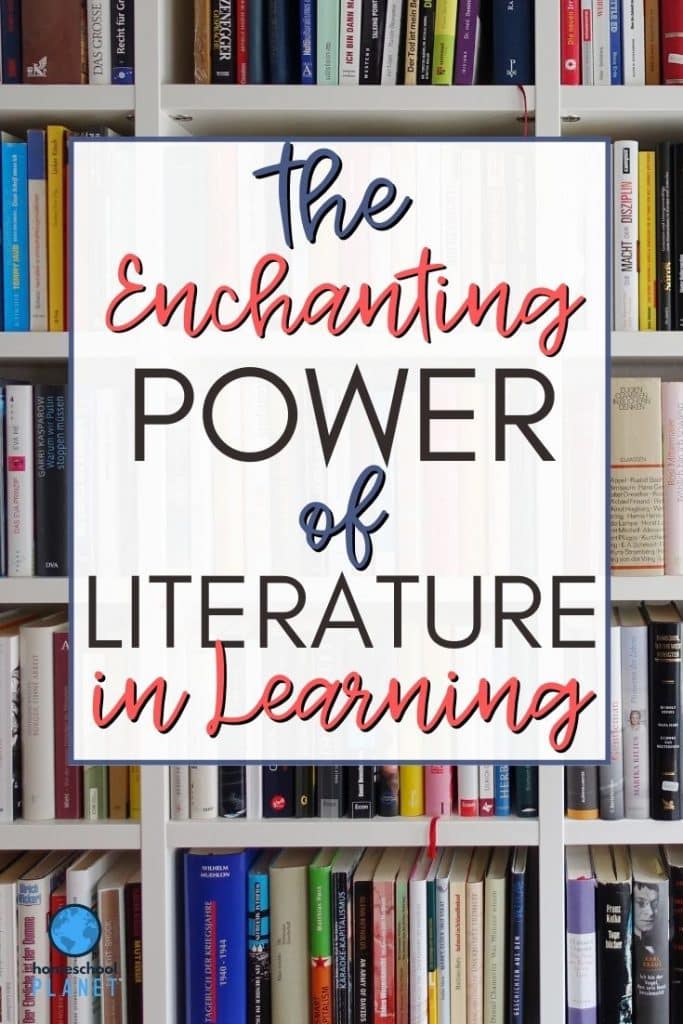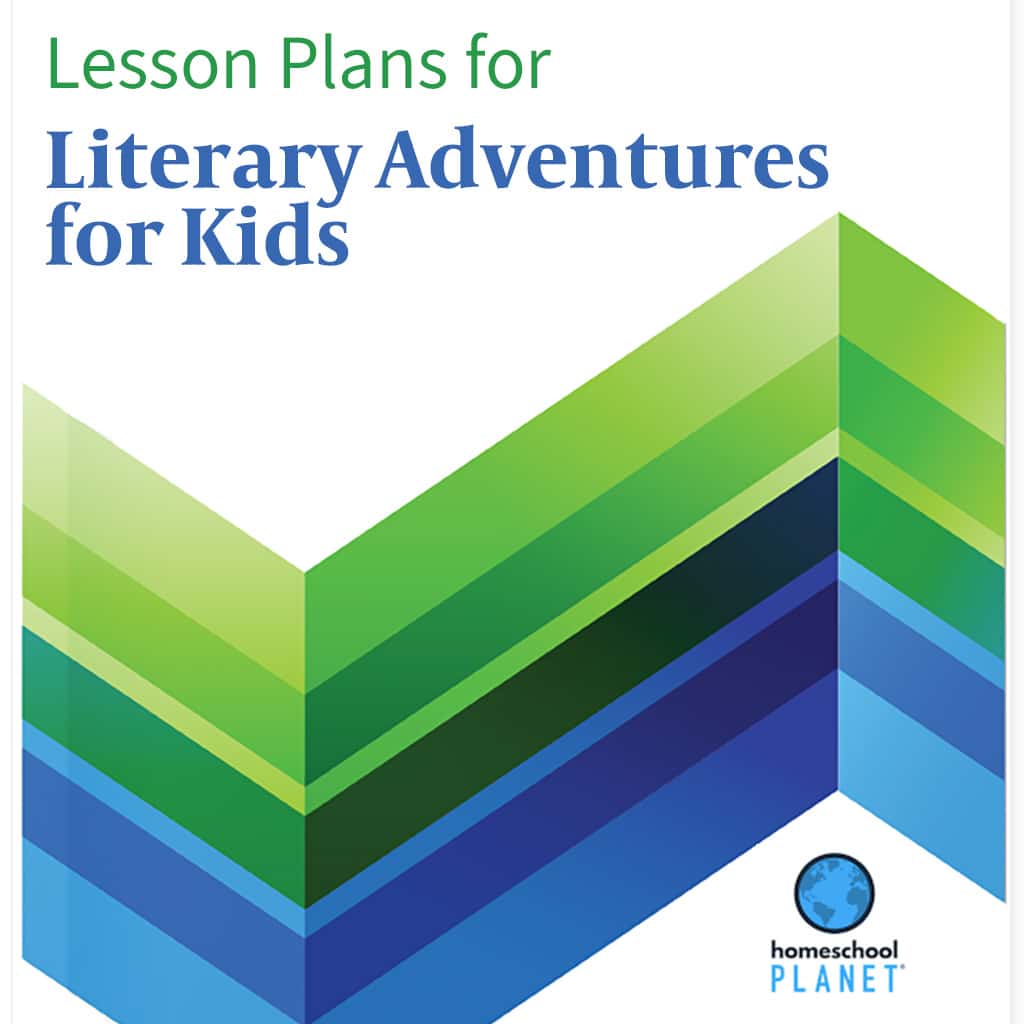The Enchanting Power Of Literature-Based Learning
Are you ready to unleash the magic of literature-based learning? (Cue the sound of trumpets and fireworks!) Okay, I know that’s a little over the top, but hear me out. Literature-based learning is not your run-of-the-mill teaching approach. It’s like a secret weapon that can transform your homeschooling experience from “meh” to “WOW!” It’s a way to make learning fun, engaging, and, yes, enchanting. So put down those dusty old textbooks, and join Dachelle from Literary Adventures For Kids as she guides us through the wonderful world of literature!

Wondering what literature-based learning is? Simply stated, it’s an approach to education that involves using literature, such as stories, novels, and other literary works, as the basis for teaching various subjects.
How To Use Literature-Based Learning in Your Homeschool
How this approach can be used in your homeschool can be hard to imagine, so let’s walk through some real-world examples.
History
Rather than relying solely on textbooks, literature-based learning can involve reading historical fiction to bring different time periods and events to life. For example, a child studying the American Revolution could read a book like Chains by Laurie Halse Anderson. Or a student studying the Victorian era could read a book like Emma by Jane Austen to gain a deeper understanding of the era and the experiences of people who lived during that time.
Science
Science concepts can be taught through literature-based learning as well. For example, a child learning about the water cycle could read a book like Raindrop, Plop! by by Wendy Cheyette Lewison. Or, a student studying engineering and physics could read a book like The Boy Who Harnessed The Wind by William Kamkwamba and Bryan Mealer which uses storytelling to explain complex scientific ideas.
Language Arts
Literature-based learning is perhaps most commonly associated with language arts, as it involves using literature to teach reading, writing, and communication skills. Students can learn grammar and spelling from copywork taken from the books they are reading. Writing projects and critical thinking questions can also come from the texts.
Social Studies
Literature-based learning can be a powerful tool for teaching social studies topics as well. For example, a child learning about different cultures and customs could read books like Inside Out and Back Again by Thanhha Lai, or I am Malala by Malala Yousafzai, which introduce different perspectives, cultures, and traditions.
Overall, literature-based learning is a versatile and engaging approach to education that can be used to teach a wide variety of subjects in the real world. By incorporating literature into our teaching, we can inspire our children’s curiosity, engage their imaginations, and help them develop a deeper understanding of the world around them.
The Benefits of A Literature-Based Approach
Literature-based learning is an awesome way of teaching that offers loads of benefits. By integrating literature into different subjects, kids can develop a love for reading, sharpen their language skills, and build critical thinking abilities. Plus, literature-based learning provides a personalized approach that takes into account the child’s unique interests and learning style.
Homeschooling parents can incorporate literature-based learning into their curriculum, resulting in an enriching and engaging learning experience for their child. So let’s dive into the enchanting power of literature-based learning and explore how it can benefit your child’s education. With a customized approach to learning, your child can develop a lifelong passion for education that will stick with them for years to come.
Enhances Language Skills
Reading is an essential skill for children, and learning through books can help children develop their language skills. By exposing children to various writing styles, they can improve their vocabulary, grammar, and sentence structure. Plus, literature-based learning can help children understand the subtleties of language and how to use it effectively.
Improves Critical Thinking Skills
Story-driven education fosters critical thinking and analysis, which are valuable life skills. When children read and analyze various stories, they learn to interpret, evaluate, and make sound judgments. Additionally, story-driven education can boost children’s problem-solving abilities.
Fosters Creativity and Imagination
Reading-based education offers a gateway to endless creativity and imagination. By diving into different stories and perspectives, kids can unlock their own self-expression and curiosity. Additionally, reading-based education can help foster and expand the creativity and imagination that are so valuable in today’s society.
Offers a Personalized Approach to Learning
By infusing literature into various subjects, kids get to explore and learn in a way that suits their unique interests and learning style. This approach to education considers the child’s interests and learning style to create a tailored and engaging learning experience. Through the exploration of various literary works, children can connect with the material in a way that resonates with them, resulting in a deeper understanding of the subject matter. It’s like a customized educational experience for your child.
Makes Learning More Engaging and Fun
Reading can be a fun and engaging activity for children, and literature-based learning can make learning more enjoyable. By adding some great reads to different subjects, children can learn and have a blast at the same time. And the best part? It can turn even the most reluctant readers into bookworms, which is a win-win for parents and kids alike!
How to Implement Literature-Based Learning in Your Homeschool
Now that we’ve explored the benefits of literature-based learning let’s discuss how you can incorporate this approach into your homeschooling curriculum.
Choose Quality Literature
The first step to implementing literature-based learning is to choose quality literature. Look for books that are exciting, age-appropriate, relate to the subjects you want to teach, and are challenging enough to stimulate your child’s interest. Think of it like finding the perfect pizza toppings – you want something that’s just right.
Align Literature with Subjects
The next step is to align the literature with the subjects you want to teach. For example, if you’re teaching history, choose historical novels that relate to the time period you’re studying. If you’re delving into science, find books that focus on scientific concepts and experiments.
Plan Activities and Assignments
Now it’s time to get creative! Plan activities and assignments that align with the literature and subject matter. For example, you could have your child narrate to you verbally or in writing, go on rabbit trails and research a topic related to the story, or create a project based on the book.
Incorporate Discussions
Talking it out is key to a great literature-based homeschool! Encourage your child to discuss the story and share their thoughts and opinions. Ask open-ended questions to stimulate critical thinking and analysis. Start these big conversations at home with your kids or start a book club and invite your child’s peers for bigger conversations.
Use Literature as a Springboard
Last but not least, use literature as a launchpad to explore different subjects and topics. If you’re reading about space, use it as an opportunity to blast off into a study of the solar system, astronomy, and space exploration!
With quality literature, subject alignment, creative assignments, lively discussions, and a healthy dose of curiosity, you can give your child a fantastic literature-based education!
Getting Started with Literature-Based Learning in Your Homeschool
If you want to make your kid’s learning experience more rewarding and enjoyable, literature-based learning might just do the trick. Here are some tips to help you get started:
Start Small
Don’t panic! You don’t have to dive into a literature-based approach headfirst. Start small by selecting a couple of books that are relevant to the subjects you’re teaching. Don’t try to do all subjects at once. You can slowly add in new books for new subjects as you go.
Allow for Flexibility
One of the great things about literature-based learning is that you can go with the flow. Allow your child to read and analyze the story at their own pace and take breaks to discuss and explore the themes.
Encourage Active Reading
Encourage your child to actively engage with the literature by asking questions, making connections, and reflecting on the story. This will help them develop critical thinking and analysis skills.
Utilize Online Resources
The internet is a treasure trove of online resources for literature-based learning, such as study guides, book summaries, and discussion forums. Take advantage of these resources to enhance your child’s learning experience.
Incorporate Different Learning Styles
Every kid learns differently, so it’s important to incorporate different learning techniques to keep them engaged. Use visual aids, hands-on activities, and other creative techniques to make the experience more engaging and enriching.
Make it Fun
Don’t forget to have fun with it! Use costumes, props, snacks, and other imaginative techniques to bring the story to life and make it an enjoyable experience for your child.
Literature-based learning can be a fun and effective approach to teaching that enhances your child’s education and fosters a love of learning.
Literature-Based Learning Versus Traditional Learning
Let’s compare two popular homeschooling approaches: traditional learning and the exciting world of literature-based learning. Buckle up, folks, it’s time to see how literature-based learning can turn your child’s education into a real page-turner!
Engagement and Interest
Textbooks and lectures can be dry and boring. Literature-based learning, on the other hand, uses books, stories, and all sorts of literary goodness to pique your child’s interests and get them excited about learning. By using literature that appeals to your child’s interests, you can create a more engaging and enriching learning experience.
Critical Thinking and Analysis
Traditional learning often focuses on memorization and regurgitation of information, while literature-based learning emphasizes critical thinking and analysis. By actively engaging with literature, children develop critical thinking skills that will serve them well in all aspects of their education and beyond.
Flexibility and Creativity
Who wants to be stuck following a rigid curriculum when you can have the flexibility and creativity that literature-based learning offers? Your child can explore literature at their own pace and incorporate different learning techniques and activities. These skills will come in handy not only in school but also in real life.
Real-World Connections
With literature-based learning, your child can learn about real-world experiences by reading stories and novels that relate to them. Making these connections can help deepen their understanding of the subject matter and make learning more meaningful.
Love of Learning
The best part of literature-based learning is that it fosters a love of learning in children. By using stories and literature to inspire curiosity and engage your child’s imagination, you can help them develop a lifelong passion for learning. And who doesn’t want that for their child?
Traditional learning may have its place, but literature-based learning is where the real magic happens. With its engaging and exciting approach, focus on critical thinking and analysis, flexibility and creativity, real-world connections, and love of learning, literature-based learning is the clear winner in the homeschooling arena.
In a world where technology and digital media dominate our lives, literature-based learning offers a refreshing and rewarding alternative. So let us embrace the enchanting power of literature-based learning and watch as our children grow and thrive in their education.
Literature For Learning In Your Homeschool

We are so pleased to announce that Literary Adventures For Kids is now part of our lesson plan marketplace! Effortlessly add your Literary Adventures for Kids curriculum to your homeschool schedule with these lesson plans for use with your Homeschool Planet subscription. Literary Adventures for Kids uses online Book Clubs are made up of Rabbit Trails of Discovery, Magic Dust Projects, Party School and even a little spelling and grammar.

